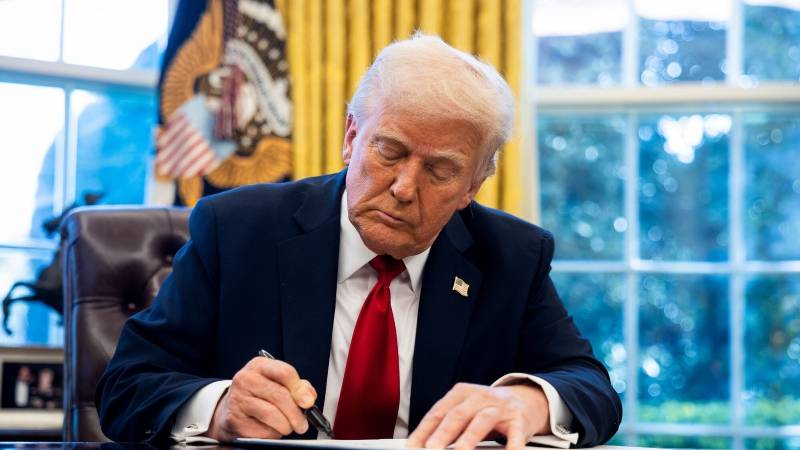New 25% import taxes on cars and auto parts entering the US have been announced by President Donald Trump.
Trump stated that the new tariffs would take effect on April 2 and that companies importing automobiles would be subject to fees the following day. Parts taxes are scheduled to begin in May or later.
The president stated that the move would boost employment and investment in the United States and that it would result in “tremendous growth” for the industry.
However, analysts predict that the action will certainly result in a temporary halt to major US auto production, raise costs, and strain relations with allies.
Trump’s recent actions could disrupt the global automotive trade and supply chains.
Last year, the United States imported around eight million vehicles, which represented approximately $240 billion (£186 billion) in trade and nearly half of total sales.
Mexico leads as the primary supplier of cars to the US, followed by South Korea, Japan, Canada, and Germany.
Numerous American automotive companies also operate in Mexico and Canada, established under the long-standing free trade agreement between the nations.
According to the White House, new tariffs on car parts from Canada and Mexico are currently on hold while US customs and border patrol develop a system to evaluate the duties. Each day, billions of dollars’ worth of goods move across the borders of these neighboring countries.
On Wednesday, General Motors’ stock dropped about 3%, while Stellantis, the parent company of Jeep and Chrysler, saw a decline of 3.6%.
In a post on X, Elon Musk indicated that Tesla would feel the impact of these measures, stating, “The tariff impact on Tesla is still significant.”
Analysts have estimated that the cost of a car made using parts from Mexico and Canada alone could add $4,000-$10,000 to its cost depending on the vehicle, according to the Anderson Economic Group.
Trump told reporters the tariffs would be “permanent” and reiterated his reasoning that: “If you build your car in the United States there is no tariff.”
The prime minister of Japan, the world’s second largest exporter of cars, said it would put “all options on the table” in response to the tariffs.
Shares in Japanese carmakers – including Toyota, Nissan, Honda – all fell on Thursday.
New Tariffs on the Horizon
The introduction of these new tariffs is anticipated to coincide with other nations implementing penalties against the US in response to previously announced taxes.
The potential impact of the car tariffs on these retaliatory measures remains uncertain.
Last year, the US emerged as the largest sales market for Jaguar Land Rover, surpassing both the UK and China.
UK Chancellor Rachel Reeves expressed to the BBC that the new tariffs would be detrimental to both the UK and the US, emphasizing that the UK is engaged in “extensive” discussions to prevent their implementation in Britain.
According to the Society of Motor Manufacturers and Traders (SMMT), the US ranks as the second-largest car export market for the UK, following the EU.
Its chief executive Mike Hawes urged the UK and US governments to “come together immediately and strike a deal that works for all”.
Trump’s announcement was described by Canadian Prime Minister Mark Carney as a “direct attack” on his nation and its auto industry.
Ursula von der Leyen, president of the European Commission, stated that the bloc would evaluate the measures prior to a possible reaction.
Trump warned “far larger” tariffs early Thursday if Canada and the European Union cooperated to cause what he called “economic harm” to the United States.
The car industry is currently facing challenges due to increased tariffs on steel and aluminum.
Major companies like Ford and General Motors have called on Trump to exempt the automotive industry from any additional tariffs.
A study conducted by the US International Trade Commission in 2024 projected that a 25% tariff on imports could lead to a nearly 75% reduction in imports, while also raising average prices in the US by approximately 5%.
White House officials expressed their desire for US workers to produce more components rather than just assemble them, asserting that their policies are encouraging companies to move operations back to the US.
On the eve of the new tariffs, Hyundai from South Korea announced a $21 billion investment in the US, which includes plans for a new steel plant in Louisiana.
Trump praised this investment as a “clear demonstration that tariffs very strongly work.”
Shawn Fain, leader of the United Autoworkers union and a Trump opponent during the election, remarked that the president is “stepping up to end the free trade disaster that has devastated working class communities for decades.”
Meanwhile, Matt Blunt, head of the American Automotive Policy Council, stated that automakers are “commited” to Trump’s goal of boosting automotive production and job creation in the US. However, American automakers emphasized the need for tariffs to avoid increasing costs for consumers.
- March Madness Elite Eight: Men’s NCAA Tournament Schedule & How to Watch - March 29, 2025
- Nintendo Confirms ‘Legend of Zelda’ Live-Action Movie Coming in 2027 - March 29, 2025
- Google Pixel 9A to Launch April 10– Features, Specs, and More - March 29, 2025





